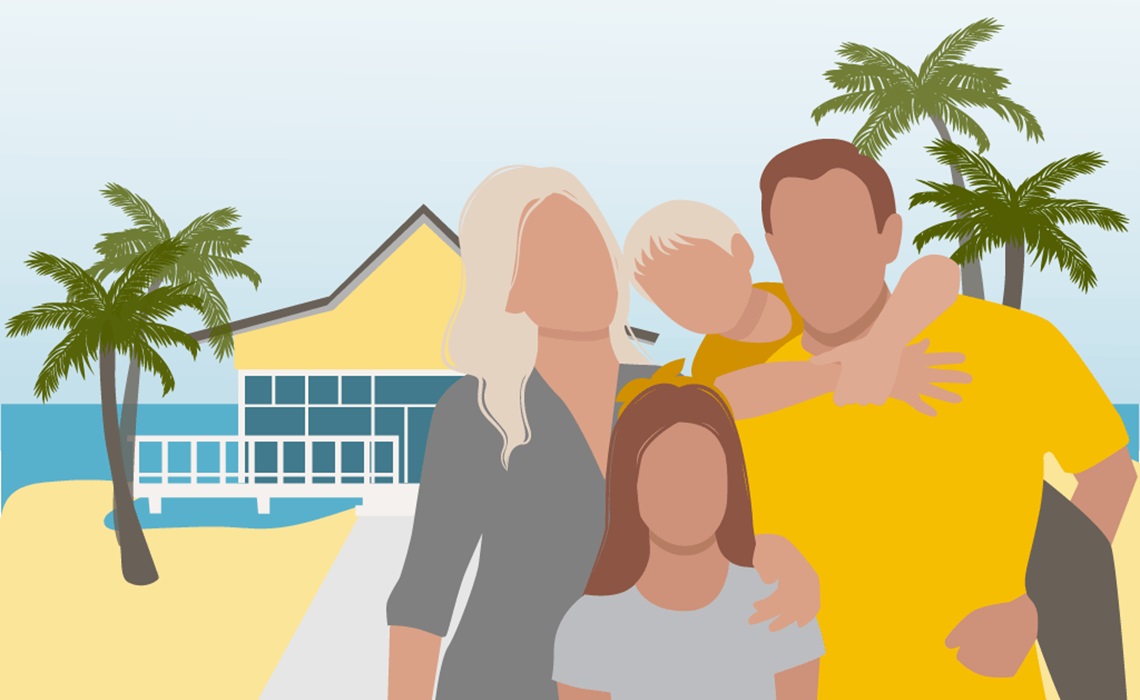Key Questions to Ask Yourself Before Buying a Second Home

It’s finally happening — you’ve decided to pull the trigger on that second home your family has been wanting for years. But are you truly ready? Whether you’re looking for a private sanctuary by the beach or an intown condo for city events, purchasing and maintaining a second home is a major decision.
While a weekend getaway property may seem like a lovely idea, a 30-year commitment can have a significant impact on your financial plan. It comes with tax implications, maintenance costs, and time demands. Before you take the plunge, here are some questions you should explore with your wealth strategist to help you determine if a second home will help your both your life and wealth appreciate.
How Solid Is Your Current Financial Foundation?
A second home is a sound decision if you’ve already worked with a professional to develop a financial plan based on your goals. As your story unfolds, you may discover new goals along the way, but the structure and discipline provided by a formal financial plan can help you determine how to accommodate necessary changes that keep your long-term plan to remain on track.
If buying a second home wasn’t part of your original financial plan, speaking to your advisor is the first step to integrate it into your road map. Some topics to discuss with your advisor include:
- Am I currently saving enough for retirement?
- Will I still be able to retire by my target date if I take on a second mortgage?
- How will this purchase change my insurance needs and liability exposure?
- Will this new expense affect my ability to fund my kids’ college accounts?
How Much Cash Should You Carry for Unforeseen Expenses?
Many investors buy a second home as a pure investment property with the intention to rent it out. But if you’re looking for passive revenue, keep in mind that rental income isn’t always guaranteed. Whether you’re looking for a long-term renter or plan on offering short-term rentals, you should still be able to cover the mortgage during periods of prolonged vacancy.
Be sure to confirm HOA guidelines about rental activity before purchasing a property for that purpose. Some homeowner associations won’t allow rentals at all. Others have a rental cap, which may change from one year to the next. Even if a property’s HOA does allow short-term rentals through services like VBRO and Airbnb, those rules change frequently – especially in popular markets inundated with short-term rental activity.
For all these reasons, it’s important to make sure you can meet your monthly mortgage payments without relying on rental income.
To evaluate this, consider:
- How much down payment can I afford?
- Do I meet the debt-to-income ratio requirements to qualify for competitive loan terms?
- What is the interest rate that works with my budget?
- Should I refinance my first mortgage or take advantage of the equity in my primary residence with a HELOC to reduce those monthly payments?
Can You Keep Up with the Maintenance?
Maintenance of any residence – primary or secondary – can be expensive in terms of both time and money. Consider the time and money you spend on routine maintenance and unexpected repairs of your main home. Now double those amounts and factor in the distance required to travel to a second property should you need to be onsite to oversee maintenance.
When it comes to second properties, homeowners aren’t always able to identify maintenance issues until they become a problem because you’re not always there. And if you’re considering the second home as a rental property, you may be responsible for even more repairs and damages.
To make sure you can cover these costs and the time investment that a second property requires, talk to your advisor about:
- What percent of the home’s value should I keep in an emergency savings account?
- What percent of rental income should I allocate to maintenance?
- Should I consider a property manager, and what do those fees look like?
How Does This Investment Affect my Insurance Needs?
For insurance purposes, second homes are considered riskier – and this usually makes coverage more expensive. Another complexity of second home insurance is your intended use of the property. Are you planning to use it as a vacation home, a rental property, or a combination of both?
Since most homeowners don’t spend most of their time at their vacation home, the company insuring the house needs to consider factors such as:
- The property’s location
- The location’s environmental risks
- How the house was built
- Its current condition
- The type of building
- The belongings within the property
When investing in a rental property, your insurance company will want to know how often you plan to rent the property and for how long. Your tenant screening process will also affect the cost of your insurance.
To lower your risk as a homeowner, speak to an insurance expert and consider supplementing with:
- Liability insurance
- Landlord insurance
- Requiring tenants to get renters insurance
Whether you’re interested in a vacation home or a rental property, it’s important to keep insurance costs in mind when choosing a second property. Picking a residence in a secure location with lower climate risk and a security system can yield significant savings over time.
How Will a Second Home Affect Your Taxes?
Talking to a tax professional is a crucial step to take before buying a second home. While there are tax breaks available for second-home owners, not all types of ownership qualify for deductions on mortgage interest, property taxes, or rental expenses.
With recent changes to the Tax Cuts and Jobs Act (TCJA), you could benefit from some of the tax breaks that are available to second homeowners. However, different rules apply depending on whether the IRS considers your home a personal residence or rental property. To make sure you know what to expect, be sure to ask your tax advisor:
- How often can I rent my home to qualify for mortgage interest deductions?
- Can I take rental expense deductions?
- How is rental income taxed?
If you’re expecting to deduct your property tax payments, it’s important to consider the current limits on these deductions. Many homeowners already exceed those limits with the taxes paid on their first home, which means you may not receive any tax savings from your second home.
Many investors also buy fixer-uppers with the intention of renovating the unit, renting it out, and then refinancing. Aside from lowering your interest rate, this strategy can also offer tax benefits, since second-home expenses or improvements may be tax deductible. While exploring ways to manage your tax liability, remember to seek advice from a real estate tax specialist who can provide expert advice on the subject.
If you’re in the market for a second home, there are many factors to keep in mind. By asking yourself the right questions and speaking with your trusted team of advisors, you can get a better understanding of how a second home might impact your ability to help your life and wealth appreciate together.


